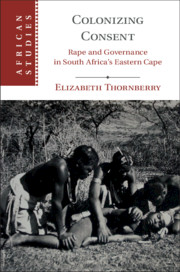Book contents
- Colonizing Consent
- African Studies Series
- Colonizing Consent
- Copyright page
- Contents
- Figures
- Acknowledgments
- Abbreviations
- Introduction
- 1 Custom and Consent in Xhosaland
- 2 Sex and Spiritual Power
- 3 Liberalism and the Colonial Law of Sexual Violence
- 4 Rape and Racial Boundaries
- 5 Navigating the Politics of Consent
- Conclusion: Rape and the Postcolony
- Bibliography
- Index
- African Studies Series
5 - Navigating the Politics of Consent
Published online by Cambridge University Press: 30 November 2018
- Colonizing Consent
- African Studies Series
- Colonizing Consent
- Copyright page
- Contents
- Figures
- Acknowledgments
- Abbreviations
- Introduction
- 1 Custom and Consent in Xhosaland
- 2 Sex and Spiritual Power
- 3 Liberalism and the Colonial Law of Sexual Violence
- 4 Rape and Racial Boundaries
- 5 Navigating the Politics of Consent
- Conclusion: Rape and the Postcolony
- Bibliography
- Index
- African Studies Series
Summary
- Type
- Chapter
- Information
- Colonizing ConsentRape and Governance in South Africa's Eastern Cape, pp. 248 - 299Publisher: Cambridge University PressPrint publication year: 2018



